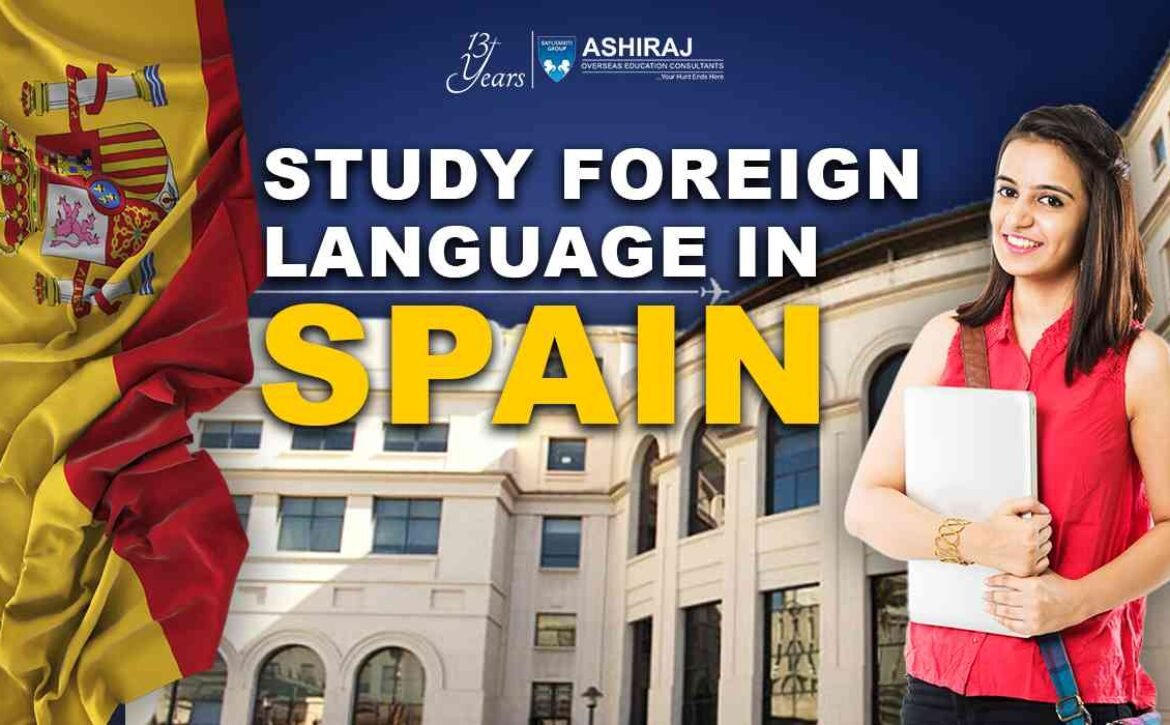
Foreign Language in Spain
Foreign Language in Spain has always played a pivotal role in the country’s cultural and educational landscape. With its rich history and diverse linguistic heritage, Spain is home to a multitude of foreign languages spoken across its regions. Spanish, or Castilian, remains the official language of the nation, but the country boasts a vibrant array of other languages, including Catalan, Galician, and Basque, each with its own unique characteristics and cultural significance. Moreover, Spain’s strategic location at the crossroads of Europe and Africa has fostered a dynamic environment for the learning and appreciation of foreign languages.
In Spain, the study of foreign languages is not merely an academic pursuit but a gateway to understanding different cultures and perspectives. With globalization continuing to reshape the modern world, proficiency in foreign languages has become increasingly valuable in various sectors such as tourism, business, and diplomacy. As a result, educational institutions across Spain emphasize the importance of multilingualism, offering diverse language programs and resources to facilitate linguistic proficiency and cross-cultural communication. Foreign Language in Spain thus represents not only a means of communication but also a bridge connecting Spain to the broader global community.
Why Study Foreign Language in Spain?
- Rich Cultural Heritage: Spain boasts a rich cultural heritage with diverse linguistic traditions, making it an ideal environment to study foreign languages. From Catalan to Galician, Spain offers a unique opportunity to immerse oneself in different linguistic and cultural landscapes.
- Gateway to Europe and Beyond: Spain serves as a gateway to Europe and beyond, making it strategically advantageous for language learners. Proficiency in Spanish, along with other regional languages, opens doors to diverse opportunities across the continent and facilitates international communication and collaboration.
- Enhanced Career Prospects: In today’s globalized world, proficiency in foreign languages is a valuable asset in various career fields. Spain’s emphasis on multilingualism equips individuals with the language skills necessary to excel in international business, tourism, diplomacy, and academia.
- Cultural Enrichment: Studying foreign languages in Spain offers more than just linguistic proficiency; it provides a deeper understanding of cultural nuances, traditions, and customs. Language learners gain insight into the diverse cultural fabric of Spain and develop a broader worldview.
- Personal Growth and Development: Learning a foreign language in Spain is an enriching personal experience that fosters growth and development. It challenges individuals to step out of their comfort zones, embrace diversity, and engage with new perspectives, ultimately leading to personal and intellectual growth.
Foreign Language in Spain thus presents a compelling opportunity for individuals seeking to broaden their horizons, enhance their career prospects, and immerse themselves in a vibrant cultural tapestry.
Top Universities to Study Foreign Language in Spain
University | QS World University Rankings 2023 | Type of University | Average Annual Fees | Programs Offered |
University of Barcelona | 150 | Public | €1,000 – €3,000 | Spanish Language, Catalan, English, etc. |
Autonomous University of Madrid | 180 | Public | €800 – €2,500 | Spanish Language, English, French, etc. |
Pompeu Fabra University | 250 | Public | €1,200 – €3,500 | Spanish Language, Catalan, English, etc. |
University of Granada | 270 | Public | €900 – €2,800 | Spanish Language, Arabic, French, etc. |
Complutense University of Madrid | 290 | Public | €1,000 – €3,000 | Spanish Language, English, French, etc. |
Studying foreign languages in Spain offers a plethora of options, especially through its top universities known for their academic excellence and diverse language programs. The University of Barcelona, ranked 150th in the QS World University Rankings 2023, offers a wide array of language programs including Spanish, Catalan, and English. The Autonomous University of Madrid, standing at 180th position, provides language courses in Spanish, English, and French, among others. Pompeu Fabra University, ranked 250th, is renowned for its programs in Spanish, Catalan, and English languages. The University of Granada, ranked 270th, offers courses in Spanish, Arabic, and French, among others. Finally, the Complutense University of Madrid, ranked 290th, provides language programs in Spanish, English, and French. These universities not only ensure academic rigor but also facilitate immersion experiences to enhance proficiency in Foreign Language in Spain, attracting students from around the globe.
Course Curriculum for Foreign Language in Spain
- Language Proficiency Levels: The course curriculum of Foreign Language in Spain typically follows the Common European Framework of Reference for Languages (CEFR), encompassing levels from A1 (beginner) to C2 (proficient). This structured approach ensures students progress systematically in their language skills.
- Language Skills Development: The curriculum emphasizes the development of all language skills: reading, writing, listening, and speaking. Students engage in interactive activities, discussions, and projects to enhance their communication abilities in real-life contexts.
- Cultural Studies: Alongside language proficiency, the curriculum integrates cultural studies to provide students with a deeper understanding of the linguistic and cultural nuances of Spain. This includes exploring literature, history, art, and contemporary issues related to the target language.
- Practical Application: The curriculum often incorporates practical application through immersion experiences, language exchanges, and internships. These opportunities allow students to apply their language skills in authentic settings, fostering confidence and fluency.
- Elective Courses: Students may have the option to choose elective courses tailored to their interests or career goals. These could include specialized language courses, translation and interpretation studies, or courses focusing on specific aspects of culture or professional domains.
Foreign Language in Spain curriculum is designed to equip students with not only linguistic proficiency but also cultural competence and practical skills essential for navigating diverse linguistic and cultural contexts in an interconnected world.
Eligibility Criteria & Admission Requirements for MS in Foreign Language in Spain
- Language Proficiency Tests: Applicants are typically required to submit scores from standardized English proficiency tests such as IELTS or TOEFL. Minimum scores may vary depending on the institution and program requirements.
- Standardized Tests for Graduate Programs: For graduate-level programs, candidates may need to provide scores from standardized tests such as GRE or GMAT, especially if they are pursuing advanced degrees or specialized programs.
- Passport & Student Visa: International students must possess a valid passport and obtain the necessary student visa to study in Spain. Visa requirements and application processes vary by country of origin and length of stay.
- Academic Certificates: Applicants are expected to submit academic certificates and transcripts demonstrating their previous educational qualifications. These documents help institutions assess the candidate’s academic background and eligibility for the program.
- Work Experience (if applicable): Some programs may require or prefer applicants to have relevant work experience in addition to academic qualifications. Work experience can demonstrate practical skills and enhance the candidate’s profile.
Scores for Language Proficiency and Standardized Tests:
Test | Minimum Score |
IELTS | 6.5 |
TOEFL | 90 |
GRE | 310 (Quantitative + Verbal) |
GMAT | 600 |
Ensuring compliance with the eligibility criteria is essential for prospective students seeking to pursue Foreign Language in Spain. Meeting these requirements enhances the chances of admission and facilitates a smooth transition into the academic and cultural landscape of Spain.
Documents Required for Studying Foreign Language in Spain
- Passport: A valid passport is essential for international students applying to study Foreign Language in Spain. It serves as proof of identity and nationality throughout the application process and duration of study.
- Letters of Recommendation (LOR): Two letters of recommendation from teachers, professors, or employers may be required to assess the applicant’s academic or professional capabilities and character.
- Statement of Purpose (SOP): An SOP outlines the applicant’s academic background, career goals, and reasons for choosing the specific language program in Spain. It helps admissions committees evaluate the candidate’s motivation and suitability for the program.
- Curriculum Vitae (CV): A comprehensive CV highlights the applicant’s academic achievements, work experience, extracurricular activities, and relevant skills. It provides a snapshot of the candidate’s qualifications and accomplishments.
- Official High School Transcripts: Transcripts from secondary education institutions provide a record of the applicant’s academic performance and achievements during high school.
- Educational Certificates: Copies of educational certificates, such as diplomas or degrees, may be required to verify the applicant’s academic qualifications and eligibility for the language program.
- Work Experience Certificate: If applicable, a work experience certificate demonstrates the applicant’s professional experience and skills relevant to the language program.
- Proof of Financial Resources: Applicants must provide evidence of sufficient financial resources to cover tuition fees, living expenses, and other costs associated with studying and living in Spain.
Ensuring the timely submission of these documents is crucial for a smooth application process and successful enrollment in a Foreign Language in Spain program.
Admission Process for Foreign Language in Spain
- Research Programs: Begin by researching language programs offered by universities in Spain. Explore their curriculum, faculty, facilities, and reputation to find the best fit for your language learning goals.
- Review Eligibility Criteria: Check the eligibility criteria for the language program you are interested in. Ensure you meet the requirements regarding language proficiency tests, academic qualifications, and any other specific criteria outlined by the institution.
- Prepare Required Documents: Gather all necessary documents, including passport, letters of recommendation, statement of purpose, CV, transcripts, educational certificates, work experience certificate, and proof of financial resources.
- Submit Application: Complete the application form provided by the university or through the online application portal. Pay attention to deadlines and ensure all required documents are accurately submitted.
- Language Proficiency Tests: Take the required language proficiency tests such as IELTS or TOEFL and submit your scores as part of the application process.
- Wait for Admission Decision: Once your application is submitted, wait for the admission committee to review your materials. This process may take several weeks, so be patient.
- Receive Admission Offer: If your application is successful, you will receive an admission offer from the university. Review the offer letter carefully and follow any instructions provided regarding enrollment procedures and deadlines.
- Confirm Enrollment: After receiving the admission offer, confirm your enrollment by following the university’s instructions, which may include paying a deposit or completing additional paperwork.
Navigating the admission process for Foreign Language in Spain requires careful planning, attention to detail, and adherence to deadlines to ensure a smooth transition into your chosen language program.
“Education is the most powerful weapon which you can use to change the world.”
Nelson Mandela
Cost of Foreign Language Course in Spain
- Tuition Fees: Tuition fees for language programs in Spain vary depending on the institution, program duration, and level of study. On average, tuition fees for Foreign Language in Spain programs range from €1,000 to €3,500 per academic year.
- Living Expenses: Living expenses, including accommodation, food, transportation, and personal expenses, also contribute to the overall cost of studying in Spain. The cost of living varies significantly depending on the city and lifestyle choices.
- Accommodation: Accommodation options in Spain range from university dormitories and shared apartments to private rental properties. Costs vary accordingly, with university accommodation typically being more affordable than private rentals.
- Books and Supplies: Students may need to budget for textbooks, course materials, and other supplies required for their language studies. These costs can vary depending on the program and course requirements.
- Health Insurance: International students studying in Spain are required to have health insurance coverage. The cost of health insurance premiums should be factored into the overall cost of studying abroad.
- Travel and Excursions: Students may also budget for travel expenses and leisure activities, including excursions to explore Spain’s rich cultural heritage and travel within Europe.
Considering these factors, students planning to study Foreign Language in Spain should carefully budget and plan for the associated costs to ensure a fulfilling and financially manageable experience abroad.
Scholarships for Foreign Language Courses in Spain
Scholarship Name | Amount | Application Deadline |
Fulbright Program | Up to €20,000 | October 15th |
Erasmus+ Scholarship | Varies | February 1st |
Spanish Government Scholarships | Varies | April 30th |
Santander Scholarships | Up to €5,000 | May 15th |
DAAD Scholarship | Varies | November 30th |
Scholarships for Foreign Language in Spain offer financial assistance to students pursuing language studies in Spain, easing the financial burden and making education more accessible. The Fulbright Program provides generous funding of up to €20,000 and has an application deadline of October 15th. The Erasmus+ Scholarship, with varying amounts, requires applications by February 1st. Spanish Government Scholarships, available for Foreign Language in Spain programs, have an application deadline of April 30th. Santander Scholarships offer financial aid of up to €5,000 and accept applications until May 15th. The DAAD Scholarship, with varying amounts, has a deadline of November 30th. Prospective students should explore these scholarship opportunities and adhere to application deadlines to enhance their chances of securing financial support for their language studies in Spain. Foreign Language in Spain programs become more accessible and affordable with the support of these scholarships.
Career Opportunities After Foreign Language in Spain
Job Profile | Average Salary (per year) |
Language Teacher | €20,000 – €40,000 |
Translator/Interpreter | €25,000 – €50,000 |
Tour Guide | €18,000 – €35,000 |
International Relations Specialist | €30,000 – €60,000 |
Foreign Correspondent | €35,000 – €70,000 |
Foreign Language in Spain opens up diverse career opportunities across various industries. Language teachers can earn an average salary ranging from €20,000 to €40,000 per year, depending on qualifications and experience. Translators and interpreters play crucial roles in facilitating communication across languages, earning salaries between €25,000 and €50,000 annually. Tour guides, providing cultural and historical insights to visitors, typically earn between €18,000 and €35,000 per year. International relations specialists, leveraging language skills in diplomatic and business contexts, can expect salaries ranging from €30,000 to €60,000 annually. Foreign correspondents, reporting on international affairs, may earn between €35,000 and €70,000 per year. With the demand for multilingual professionals on the rise, individuals proficient in Foreign Language in Spain have the opportunity to pursue rewarding careers while contributing to cross-cultural understanding and communication in an increasingly interconnected world.
Frequently Asked Questions About Foreign Language in Spain
Yes, Spain offers a wide range of foreign language programs including Spanish, Catalan, Galician, Basque, and more.
Eligibility criteria vary, but commonly include language proficiency tests (IELTS or TOEFL), academic qualifications, and specific program requirements.
Yes, various scholarships such as Fulbright, Erasmus+, and Spanish Government Scholarships are available to support language students.
Tuition fees typically range from €1,000 to €3,500 per academic year, excluding living expenses.
Yes, many universities offer language programs in English, especially at the graduate level.
Yes, international students are allowed to work part-time during their studies, typically up to 20 hours per week.
Career options include language teaching, translation, international relations, tour guiding, and foreign correspondence.
After receiving an admission offer, apply for a student visa at the Spanish consulate in your home country.
Yes, health insurance is mandatory, and students must have coverage throughout their stay in Spain.
Yes, students can apply for visa extensions or explore opportunities for further studies or work in Spain upon program completion.




